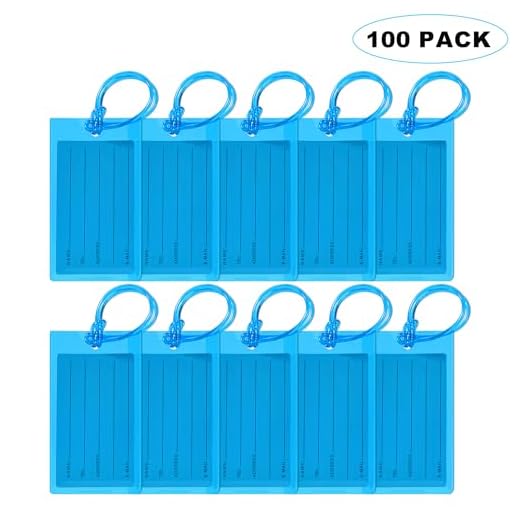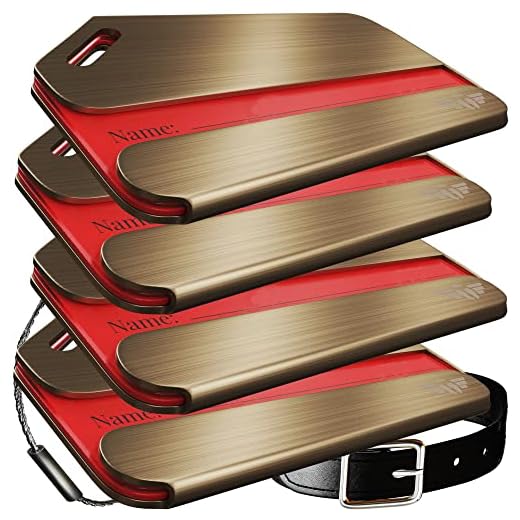






Attach personalized identification to your suitcases before proceeding to the dock. Choose durable, waterproof materials to withstand various weather conditions during your holiday at sea. This ensures that your belongings remain recognizable throughout the trip.
List important details on your identifiers, including your name, phone number, and email address. Consider adding your home address for further identification but ensure to keep it secure. Remove any old identifiers from previous travels to avoid mix-ups.
Utilize colorful designs to make your bags easily distinguishable among many others. Bright colors and unique patterns can help minimize the risk of taking someone else’s belongings by mistake. Incorporate a unique visual cue, such as a sticker or ribbon, for added personalization.
Secure the identification firmly to the handles or straps to prevent them from coming loose during transport. Check that they are positioned where they can be easily seen but not easily damaged. Regularly inspect them for wear and tear, replacing any that appear faded or damaged.
Optimal Application of Identification Labels on Journey
Affix identification markers securely at the top of the suitcase to enhance visibility. Ensure that they are not obstructed by handles or straps, facilitating easy reading by porters and staff.
Key Points for Effective Marking
- Utilize sturdy, water-resistant materials for durability during handling.
- Include clear, legible information: full name, phone number, and email address.
- Incorporate unique identifiers like a booking number or cabin assignment to streamline retrieval.
Best Practices Before Departure
- Check cruise line requirements for label specifications.
- Print information clearly or handwrite if necessary, ensuring legibility.
- Consider color coding labels to easily distinguish your items from others.
Choosing the Right Type of Luggage Tag
Select durable materials such as PVC or heavy-duty plastic, which withstand wear during handling. These options ensure longevity and protect against tears or water damage, keeping your details safe throughout your travels. Look for tags with reinforced stitching and sturdy loops for secure attachment.
Types of Tags
| Type | Benefits |
|---|---|
| Woven Fabric | Lightweight, customizable, and stylish; prone to wear over time. |
| Plastic Covered | Water-resistant, easy to clean, and durable; limited room for information. |
| Leather | Elegant appearance; offers durability but can be heavy and less practical for frequent use. |
| Metal | Highly durable, often rust-resistant; may require special engraving tools for personalization. |
Information to Include
Ensure to provide your name, contact number, and email address. Consider adding emergency contact information or cruise details, should your belongings get misplaced. Using a durable and waterproof cover is advised to keep this information intact. For additional tips on maintenance, refer to this refilling a co2 tank with an air compressor a step by step guide.
How to Properly Fill Out Your Luggage Tags
Clearly state your full name on the tag. Use a legible font and avoid any initials or nicknames to ensure easy identification.
Include your home address with the city, state, and zip code. This provides a complete reference should your belongings be misplaced. Consider inserting a contact number as well, preferably a mobile phone for quick reachability.
Additional Information
For international travel, add your country name. This helps in locating and routing your bags if they end up in the wrong area.
Consider adding an email address, especially if you may not have direct phone access during your trip. Ensure that the information is up-to-date and check for any typos before sealing the tag.
Visibility and Durability
Make sure the details are written in waterproof ink or printed on a durable label. Affix the tag securely to prevent it from detaching during transport.
Finally, attach any additional identification, if required by the cruise line, in a clear compartment within the tag. This ensures all crucial information is readily accessible if needed.
Best Practices for Attaching Luggage Tags
Ensure a secure attachment by using durable strings or loops. Avoid flimsy materials that can break during handling. Opt for tags with a built-in loop or a strong adhesive back for maximum reliability.
Placement Tips
Position the identifier on the top handle or a visible part of the bag so staff can easily spot it. This minimizes the chance of misplacement during transit. Avoid placing the label inside pockets or under flaps for better visibility.
Weatherproofing
If traveling to regions with unpredictable weather, consider waterproof options to protect your information. Use a protective cover for paper tags to prevent damage from moisture. Look into products designed for outdoor conditions, similar to those found in the best luggage for snowboarding.
For extra protection, secure the tag with an additional fastener, like a zip tie, preventing it from falling off. Always double-check before departing to ensure all is tightly secured.
Consider pairing your travel essentials with reliable storage solutions, such as the best camera lens waist pack, keeping your belongings organized alongside your identifiers.
What to Include on Your Luggage Tags for Security
Include only your surname and the initials of your first name. Avoid full names to protect personal identity.
Listing your home address may seem practical, but public visibility poses risks. Instead, use a contact number for a trusted friend or family member.
Contact Information
Provide a phone number that can receive calls or texts. Choose one accessible both domestically and internationally. Ensure the number is current and easy to dial for others.
Additional Details
Indicate a unique identifier for each container, such as your cabin number or a reservation code. This can assist staff in reconnecting misplaced items efficiently. Avoid personal email addresses to minimize unwanted communication.
Identifying Your Bags Quickly During Boarding
Choose colorful or unique designs for your travel cases. Bright colors or distinctive patterns make it easier to spot your belongings among others.
Attach distinguishing items, such as ribbons or stickers, to your bags. This addition provides a simple way to recognize your property at a glance.
Label your belongings with custom identifiers, such as personalized patches or markers. These can further differentiate your baggage from similar ones.
Position your identification prominently on the outside. Ensure that the details are visible without having to open the cases, saving time when retrieving your items.
Consider using reflective or luminescent materials for visibility during dim lighting situations. This feature enhances recognition even in crowded or poorly lit boarding areas.
Designate specific colors or symbols for each family member’s items. This method helps to quickly associate bags with their owners, easing the identification process.
Maintain a list of your packed items. Knowing what’s inside each case can expedite retrieval and minimize confusion during the boarding process.
Be vigilant as you approach the luggage area. Familiarize yourself with your bags’ appearance to avoid mistakenly picking up someone else’s belongings.
Tips for Maintaining Your Identifiers on the Voyage
Ensure that your identifiers remain legible throughout the trip. Use a protective covering, such as clear plastic sleeves, to shield them from weather conditions and wear.
Regularly Check for Damage
- Inspect identifiers before departure and during the trip.
- Replace any that show signs of wear, fading, or damage immediately.
Keep Information Updated
- If any details change, like your contact number or residence address, reprint and update your ID.
- Maintain spare copies of your labels with updated information in your carry-on.
Secure identifiers with strong ties or straps to prevent them from detaching or getting lost during handling.
- Consider using zip ties for added security.
- Choose fasteners that complement the style of your bags.
Enhance Visibility
Opt for recognizable colors and patterns for your identifiers, making them easier to spot among other belongings.
When disembarking, double-check that your identifiers are still attached to your possessions before leaving the area.







